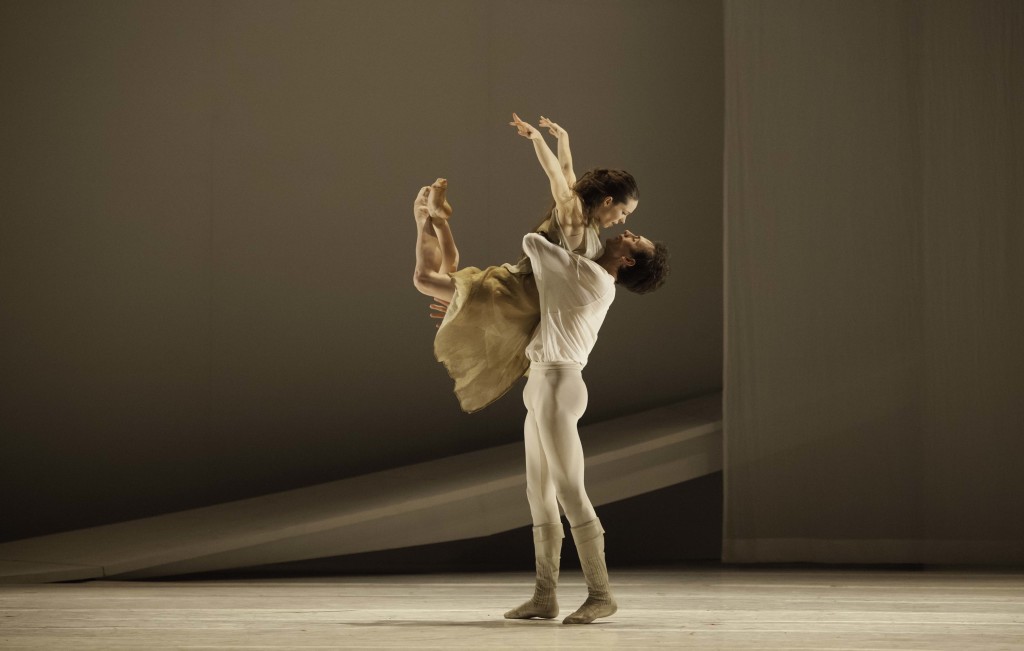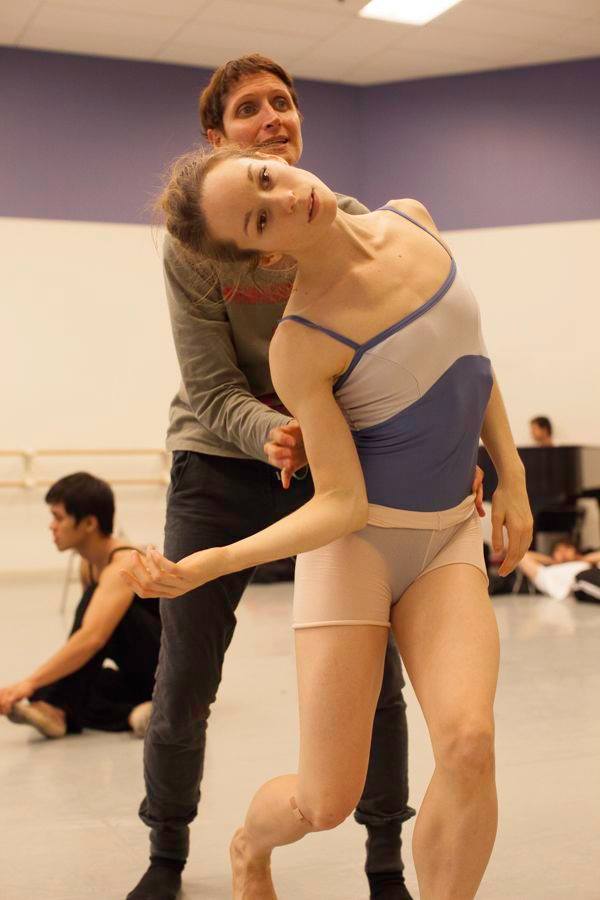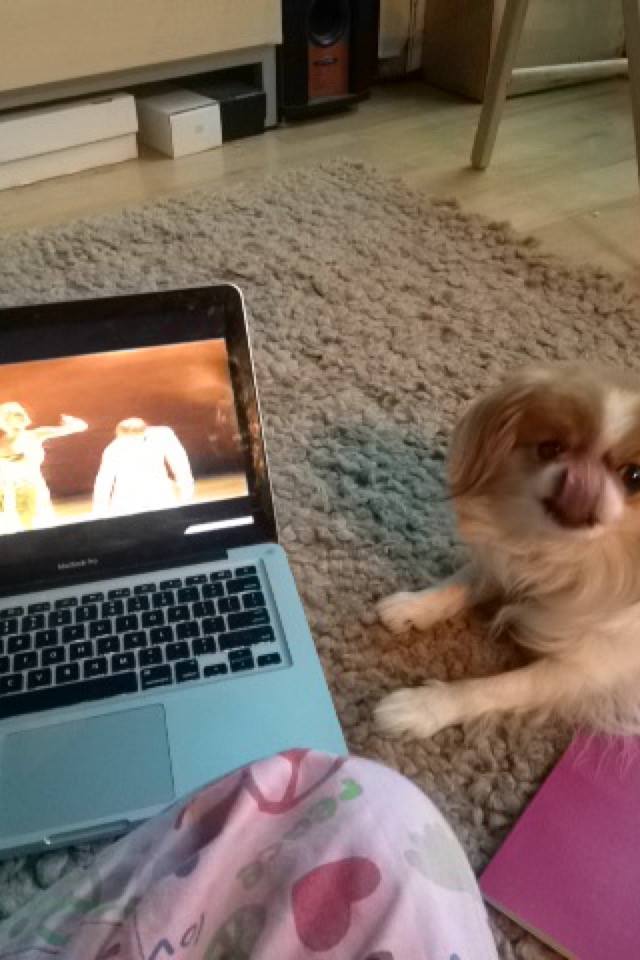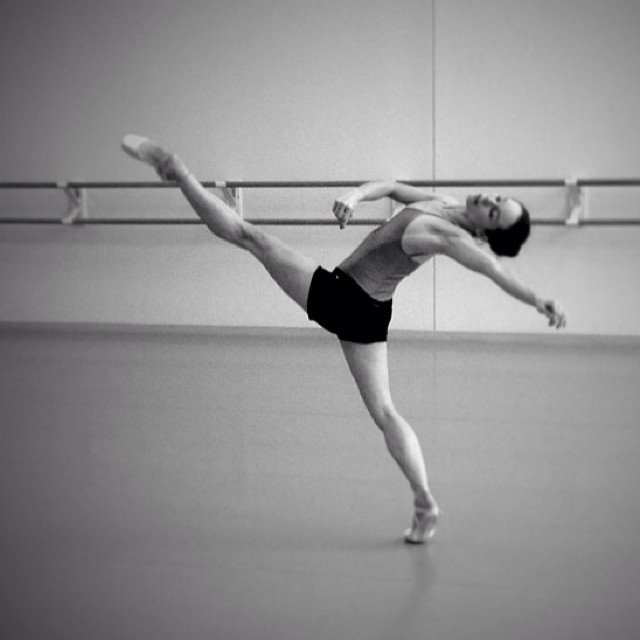Some insight on being fully immersed in a role, creating a character, not comparing yourself to the past 400 years of Juliets, and kissing your co-workers…

by Alessa Rogers
“Let love drive you.” These are not the words of Shakespeare but of stager Giovanna Lorenzoni as she attempts to mold me into a Juliette Capulet worthy of Jean-Christophe Maillot’s stunning ballet. They are the words that have been driving me since I was first cast as Juliette in October 2013, through the intense rehearsal process that led to the first time Atlanta Ballet performed the ballet last year and now, as I prepare for an encore round of shows February 6-14. As I prepare for my second shot at what has become my favorite ballet, I reflect on the process, on remembering that opening night is just one night, and how the genius is in the details.
DIFFERENCES
For me, being cast as Juliette was a dream come true. But as is the case with most dreams, reality was a little different than I imagined. First of all, this version, which was choreographed in 1996 for Les Ballets de Monte Carlo, is a departure from the classical versions I grew up with. This is a stripped down, more contemporary version. Third Act I am barefoot. There are no lavish sets, cumbersome period piece costumes, and nary a sword or a vial of potion to behold. Instead, the story is told through the movement and the musicality only. As such, every step is vitally important. Nothing is thrown away or meaningless. There is text in every gesture, tension is every moment of stillness.
Juliette herself is different too. She is older than she is normally portrayed, closer to woman than girl. She is fierce and fearless and knows a thing or two about the world. She knows herself and what she wants. She takes the lead in the budding romance with Romeo, demarcating their boundaries or lack thereof. The streak of mischief in this Juliette is part of the reason why I got this role in the first place. Early in the process one of the stagers from Monte-Carlo came upon me in the hallway, shoving a piece of cake into the mouth of one of the other dancers. That, she said, is exactly what Juliette would do.

THE PROCESS
Two setters, Giovanna Lorenzoni and Asier Uriagereka, came from Monte-Carlo for five weeks to teach us the ballet. Normally they spend much more time teaching R & J but we didn’t have that time. Working with these two was an amazing and grueling experience, a process that really suited my particular temperament. They were relentless about details. We would literally spend an hour on a single hand gesture, every step being that important. Details about the breath, the pinky finger, how to cross my knees, how to kiss with my head downstage instead of upstage. There were whole days where we would not even put on the music because we were breaking down the steps so minutely. We worked precisely, deliberately and there was never a wasted moment in rehearsal. I loved it. Everything about the process made sense to me. Giovanna and Asier had so much passion for the production that it infected everyone. They worked us so hard but I kept wanting more. I craved the intensity because I knew it was the only way to become a better Juliette. There was one day where a rare ice storm hit Atlanta and while everyone was eager to get home to play in the snow I was anxiously trying to get as much rehearsal in as possible before I absolutely had to leave. I was a junkie for Juliette.
The life I led before R &J was immediately placed on hold. Nothing mattered but Juliette. I woke up in the morning, usually from an R & J dream (or nightmare), and listened to the score before I had breakfast. During lunch I would find an empty studio and rehearse myself and at night I would go over the day’s notes in my kitchen, spatula in one hand, notebook in the other, using my reflection in the refrigerator as a mirror.
We used a lot of video to watch the original cast and once we started doing runs I watched a lot of videos of myself to critique and refine. I would even study in between performances. I am the type of dancer that writes a lot of notes so I always have a notebook with me. It’s my prized possession now as there are little notes in there from last time that help me as we mount it again, tips like “Remember: he is the lover, you are the love” and where and how many water bottles to place on each side of stage.
The process is where the magic happens. I am a process girl so often I love the rehearsals as much or more even than performing. It’s where I grow the most, where I am vulnerable, make discoveries, learn things about myself, transform. And especially in this ballet, the performing is simply living the story. I don’t have neon lights flashing through my head saying “PERFORM.” I am just trying to do one true step after another.

CREATING THE CHARACTER
Playing a role like Juliette brings a lot of challenges because everyone knows the story and everyone has their own idea of who she is. There are a plethora of Juliets in the world. Theatre, film and dance have all latched onto this play because there is something about it that speaks to people. While preparing for the role I read the play, obviously, and watched many different film and dance versions of Romeo and Juliet, but ultimately my job is to find myself in Juliette and make the role my own, regardless of other people’s interpretations. By watching other versions I am not trying to become like any Juliet that has come before, or even to compare myself to them, but more to feel a connection to the history that came before me. Because when it comes down to it, trying to force yourself to become another person’s version of anything doesn’t work so well. I have watched the original Les Ballets de Monte-Carlo Juliette, Bernice Coppieters, probably a hundred times but I still look nothing like her. I never will. I can’t. But it doesn’t mean she can’t still inspire me.
There is an aspect of using personal experiences to direct me emotionally in a scene but I prefer to make choices based on what Juliette would feel rather than how I, Alessa, would react in the same situation. For example, I don’t bring my real-life boyfriend Carson into the studio with me in my head when I am about to do say, the first encounter pas. Because that story is the story of us, not of Romeo and Juliet. It’s a different thing altogether. I don’t even think of my Romeo, Christian, by his real name. When we are in the studio and the music is on, he is Romeo to me. If I can get into the headspace where I am not Alessa pretending to be Juliette, but that I actually am Juliette then the acting succeeds. You just have to get out of your own self and into the skin of your character.
In daily rehearsals for R & J it can be hard to jump straight into the tragedy of the 3rd Act without the build up of the previous two. The same with kissing my Romeo, Christian. It can be awkward doing it when there is a room full of people a foot away from you. Unromantic when you’ve had 6 hours of rehearsal and you are both sweaty and the ballet mistress is in your ear telling you that you are off the music. But once we are doing runs of the ballet, everything flows effortlessly. It’s the way the ballet is put together, everything is so honest, the acting doesn’t feel like acting at all. It’s like tunnel vision when we dance the balcony pas–I only see my Romeo, everyone else in the room melts away. When I performed it last year, I was so unaware of the audience, more so than during any other ballet. I was so intensely present–I wasn’t dancing for anyone, I was just existing as Juliette.
It is hard to come down from a role like that–especially when you have another show in a few hours–because you go through so much in a single show–you are left raw and drained. But it’s so worth it.

THE DAGGER
The day we started rehearsal for this year’s Romeo et Juliette the other dancers joked, “See you in March.” Because that is how much focus I have to give to this role. I remember when my artistic director told me, a week after last year’s run ended, that we would be bringing it back the following season I thought to myself, ‘But I still have scars from the time before!’ (Literally–I had scrapes and bruises all down my legs.) And I certainly had not recovered emotionally. But I was ecstatic nonetheless.
To do a ballet like this, especially when there is only one cast, requires you to become an ascetic of sorts. I gave up certain bad habits, I stopped going out with my friends, my boyfriend racked up a whole lot of IOUs for taking the dog out. I used to have hobbies–I think–but I can’t remember what they are now. I can have whole days of rehearsal in the back studio and not see another dancer. Until recently, I’d never even seen whole sections of the ballet that I am not in. In a way it can be very isolating and lonely but it was what I had to do. I became an automaton in my personal life, regimenting what and when to eat, exactly what time I would check my props, when I should wash my hair so it looked right for third act, meticulously planning anything that would give me a bit more energy later or take a little bit of stress away. In fact to this day if I have the particular juice that I drank before each show, I start getting pre-show nerves–even on a random Tuesday! I’m not a very superstitious person but I used the same mug every morning of the 2 week run. What can I say–it was a compulsion.
Looking back, I don’t know how I did it. But I also don’t think I could have done it any other way–with anything less than full and complete absorption and focus.
After the final R & J show last year I was in a daze. I couldn’t make decisions or complete sentences. I was completely spent. I felt hollow, like someone had taken a washboard to my insides. After all my regimenting, I had four Twix bars for dinner at 2 in the morning then woke up the next day to listen to the score as I had every morning since the process began before realizing….. wait, it’s over. I didn’t know what to do with myself.

HERE WE GO AGAIN
Going into it the second time there are some differences. The previous Lady Capulet retired and casting changes affect the dynamics. We have to split rehearsal time between Romeo et Juliette and our March world premiere. I haven’t gone as crazy as I did last time, though I still wake up and go to bed listening to Prokofiev. I feel freer. It is easier knowing the choreography already but without having the original stagers a lot of responsibility falls to me to remember the minute details that they were so particular about. In today’s world there is the benefit of Skype and so we will be able to get some notes sent to us from Europe. Originally we learned the death scene just a couple days before we went to the theater in order to keep it fresh and also to not drain us emotionally. This time around, though, we have to be aware of anticipating the feelings throughout the ballet because the steps are in us now.
I know that come show time I will still be nervous. I will still have feelings of inadequacy, despite (or possibly because of) last year’s positive response, because I am a dancer and that’s what we do. There is the pressure (from myself mostly) of comparison from last time, the pressure to do it better, to meet and exceed expectations. But I have to remember that it is someone else’s job to judge my performance. I just have to trust that the details are in my body, and that Juliette is a part of me now.

CATHARSIS
Juliette is such a complete character. She experiences in 2 and a half hours every emotion a person could possibly feel and it is liberating to fully embrace and abandon myself to those feelings. There was so much work that went into it- I can honestly say I could not have worked any harder. When the curtain came up for my bow on the final show, I was utterly unable to hold in the emotions of the work, the stress, the love, the fun, the weirdness, the intimacy, the joy, the pain, the craziness, the vulnerability, the exhaustion, everything that I had given and used up in the process of being Juliette. I bawled like I never have before. It was a catharsis.
Usually when you embark on a big role you imagine that you will become a stronger or more technical dancer but what I gained from my experience as Juliette went beyond that. There was a shift inside me that I had not anticipated at the beginning of the process. I am not the same person that I was when we started rehearsals in October 2013.
Jean-Christophe Maillot’s Romeo et Juliette is a ballet that is so special, so pure, so precious to me. It reminds me that the stager used those same words to describe Juliette’s relationship to Romeo. And it is true- I have loved this ballet like I’ve loved a person. In the year in between runs, I missed it the same way too. In a way I am reluctant for the opening night to come because when it does it means that it is almost over. I know I will mourn it when it is done.
But until then, I will let love drive me.
See Alessa dance in Jean-Christophe Maillot’s Roméo et Juliette with Atlanta Ballet, February 6the through the 14th.
 Contributor Alessa Rogers began her dance training with Daphne Kendall and left home at fourteen to attend the North Carolina School of the Arts. Upon graduation she spent one season with North Carolina Dance Theatre II before joining Atlanta Ballet where she has been for the past eight years.
Contributor Alessa Rogers began her dance training with Daphne Kendall and left home at fourteen to attend the North Carolina School of the Arts. Upon graduation she spent one season with North Carolina Dance Theatre II before joining Atlanta Ballet where she has been for the past eight years.
Favorite roles at Atlanta Ballet include Juliette in Jean-Christophe Maillot’s Romeo et Juliette, Margaret in the world premiere of Helen Pickett’s The Exiled, Lucy in Michael Pink’s Dracula, Ophelia in Stephen Mills’ Hamlet, Lover Girl in David Bintley’s Carmina Burana, and Princess Irene in the world premiere of Twyla Tharp’s The Princess and the Goblin.
She has performed works by Jorma Elo, Wayne McGregor, Ohad Naharin, Christopher Wheeldon, Christopher Hampson, Dwight Rhoden and Tara Lee. She has been a guest artist with the National Choreographers Initiative in California and Terpsicorps Theatre of Dance in Asheville, N.C.
In her spare time she likes to read, write, cook vegetables, meditate, travel and rock climb.





[…] of her transformation into “Juliette” in Jean-Christophe Maillot’s “ROMEO ET JULIETTE here, which premiered this past […]